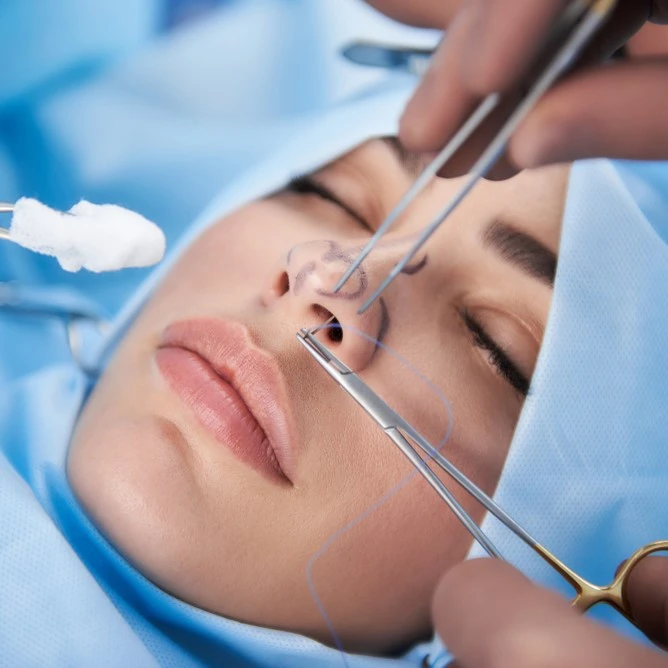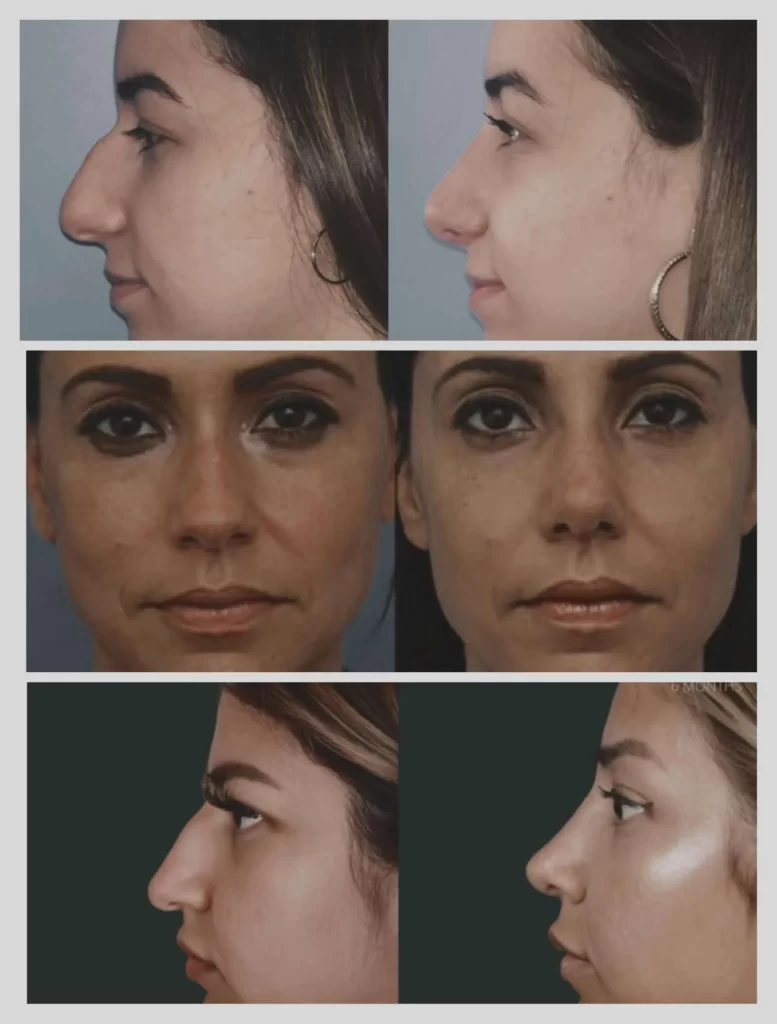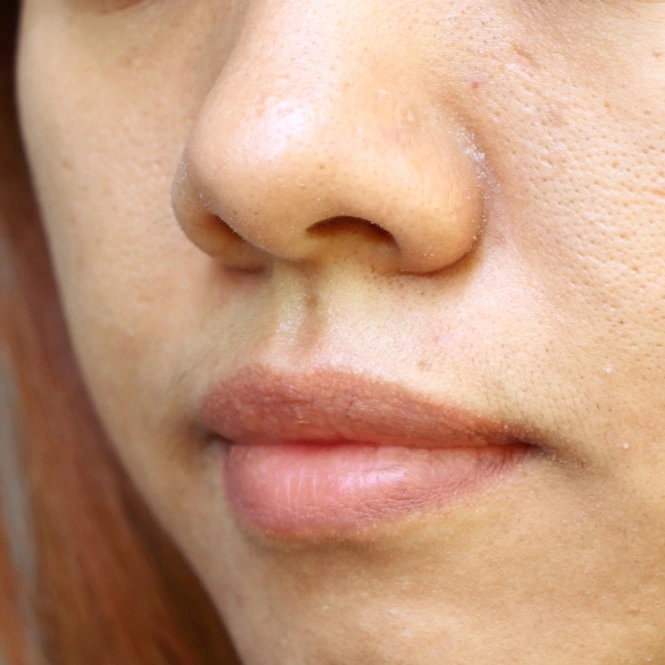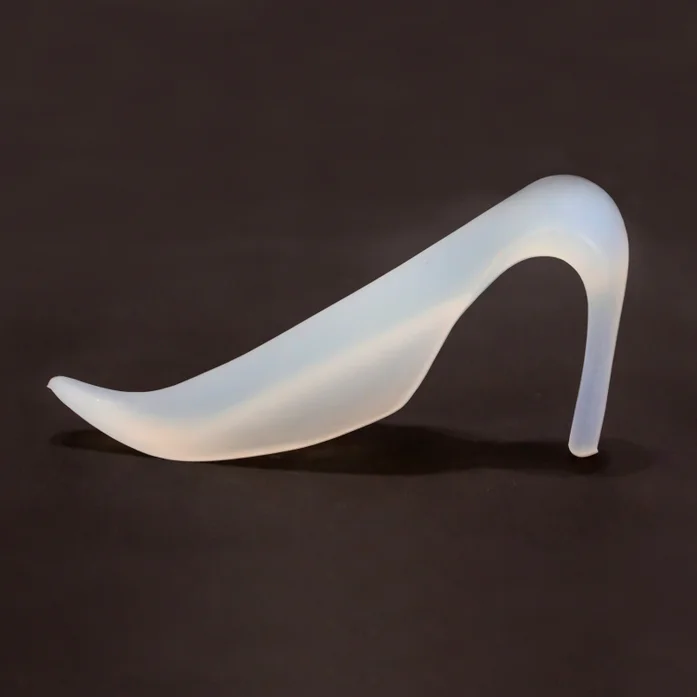Reshape Your Look, Renew Your Confidence with
Rhinoplasty in Riyadh
Enhance Your Facial Harmony!
Read in Arabic
What is Rhinoplasty?
A rhinoplasty or nose surgery is a surgical procedure used to treat nasal breathing problems and improve the appearance of the nose. The procedure is carried out for both cosmetic and medical reasons, such as when a patient is unhappy with the appearance of their nose and has a deviated nasal septum or nasal fractures.
Procedure Time
1.5 - 3 Hours
Downtime
3 - 5 Days
Back to Work
5 - 7 Days
Results
3 - 12 Months
Who is a Right Candidate for Rhinoplasty in Riyadh?
The ideal candidates for surgery are those who want to improve
- Nasal asymmetry or Nasal framework
- Nasal hump or depression on the bridge
- Wide or upturned nostrils
- Large or bulbous nasal tip
- Congenital defects or injury to the nose
Benefits of Rhinoplasty
- Your nose’s size will be reduced.
- Rhinoplasty could help you in nose reshaping.
- You’ll be able to breathe more easily
- Rhinoplasty can fix the birth abnormalities you have.
- Rhinoplasty could Boost your self-assurance.
- More exciting features will be added.
Enhance Your Beauty with a Custom Rhinoplasty - Book Your Nose Reshaping Appointment Today at Enfield Royal Clinic!
Types of Rhinoplasty
There are three major types of rhinoplasty.
Functional Rhinoplasty
The primary objective of a reconstructive rhinoplasty, also referred to as a “functional” rhinoplasty, is to improve breathing (the “function” of the nose). The safest treatment option for a range of respiratory problems in the nose is a functional rhinoplasty.
Cosmetic Rhinoplasty
Cosmetic rhinoplasty is a surgical procedure that is used to change the shape or size of the nose in order to improve its appearance. It can be used to correct issues such as a bump on the bridge of the nose, a wide or upturned nose, a large or bulbous tip, or asymmetry. The procedure is usually performed by a plastic surgeon and is done under general anesthesia.
Revision Rhinoplasty
Revision rhinoplasty is a surgical procedure that is done to correct or improve the results of a previous nose surgery (primary rhinoplasty). It is typically more complicated than a primary rhinoplasty, as the surgeon may need to address both the original problem and any complications that have arisen from the first surgery. Revision rhinoplasty is usually done by plastic surgeons with specialized experience and skill in this field.
Nonsurgical rhinoplasty, also known as a liquid or noninvasive nose job, is a cosmetic procedure that allows individuals to enhance the appearance of their nose without undergoing surgery. Unlike traditional rhinoplasty, which involves incisions and restructuring of the nasal bones and cartilage, nonsurgical rhinoplasty utilizes injectable fillers to reshape and contour the nose.
Procedure

Before the Procedure
Consultation
The first step is to have a consultation with a qualified facial plastic surgeon. During this appointment, the surgeon will evaluate your medical history and current health, discuss your goals and expectations for the procedure, and examine your nose to determine the best course of action.
Pre-operative Instructions
The rhinoplasty specialist will provide you with pre-operative instructions, which may include avoiding certain medications or supplements, stopping smoking, and avoiding alcohol for a certain period before the surgery.
Imaging
The surgeon may use computer imaging to show you an approximation of the expected outcome of the surgery.
During the Procedure
Anesthesia
In the first step you will be given local anesthesia with sedation. You won’t feel any discomfort throughout this operation because it will numb the affected area.
Incisions
After giving anesthesia, a small incision is made in that appropriate area. There are two techniques for making an incision. It can be made inside the nose and it is known as closed rhinoplasty. It can also be made at the thin strip between the nose known as open rhinoplasty.
Reshaping the Nose Structure
After the incisions are done, the skin that is still intact between the nose lifts and is easily removed.
Correcting a Deviated Septum
The necessary adjustments will be made by the surgeon to change the nose’s form. lowering the size of the nose and removing its bone or cartilage.
The nose gets bigger when an extra cartilage is attached to it. to straighten the septum’s crookedness. As a result, nasal ventilation is improved and internal nasal projections are diminished.
Closing the Incision
The skin will finally be reshaped and remain intact with the stitches, which may or may not be absorbable.
Rhinoplasty Before and After

What to Do After Rhinoplasty Procedure?
- You must raise your head to the level of your chest following rhinoplasty surgery in order to stop any bleeding and swelling.
- You must apply tape or a splint to the injured region to provide protection.
- Reduce your exercise for a minimum of a few weeks.
Stay away from stretching exercises. - Avoid blowing or rubbing your nose for one week following surgery.
- Check with your doctor again in two weeks.
- Must use pain medications recommended by your rhinoplasty specialist.
Different Stages of Swelling
Swelling is a normal part of the healing process after a rhinoplasty procedure.
Initial Swelling
Immediately after the surgery, there will be significant swelling and bruising around the eyes and nose. This is normal and is caused by the trauma of the surgery and the effect of anesthesia.
The swelling will be at its worst in the first 24-48 hours after the surgery.
Subsiding Swelling
Within the first week, the swelling will begin to subside and the bruising will start to fade. The nose will also start to take on its new shape.
Residual Swelling
Even though the swelling has subsided, there may still be some residual swelling present for several weeks or even months. This is because the final shape and contour of the nose may not be fully apparent until all the swelling has completely resolved.
Asymmetrical Healing after Rhinoplasty
Asymmetrical healing after rhinoplasty refers to a situation where one side of the nose heals differently than the other side. This can result in a nose that appears uneven or asymmetrical, with one side appearing larger or differently shaped than the other. Asymmetrical healing can occur due to a number of factors, such as:
- Differences in the shape or thickness of the bone or cartilage on each side of the nose.
- Differences in the amount of swelling or bruising on each side of the nose.
- Differences in the rate of healing on each side of the nose.
Recovery & Healing
Recovery requires a lot of time. You will feel significant swelling around your nose for a few weeks; if your immune system is weak, this swelling could extend for several months.
We wish you well and strongly encourage you to avoid strenuous activities and heavy lifting during this time.You can safely resume cardiovascular exercises like jogging, swimming, and cycling after 3–4 weeks.
After six weeks, the bones are stabilized, and you can start lifting weights again, wearing glasses, and blowing your nose.
The results of a rhinoplasty procedure will typically be visible within the first few weeks after surgery, as the swelling and bruising subside. However, it’s important to note that the final results of the surgery may not be fully visible for several months, as the nose can continue to heal and change shape during this time.
Rhinoplasty Cost Riyadh (Saudi Arabia)
Rhinoplasty
Starting FromRhinoplasty
StandardSince everyone has different results in mind, it is difficult to determine a single pricing that works for everyone. Rhinoplasty cost in Saudi Arabia (Riyadh) can range from SAR 22,000 to SAR 28,000. For a precise price estimate specific to your case, please fill in the form and discuss with our staff!
When to Call a Doctor for Your Help?
It’s important to follow your surgeon’s post-operative instructions and attend all follow-up appointments after a rhinoplasty procedure. If you experience any unusual symptoms or complications, you should contact your doctor for help.
Some symptoms to look out for that may indicate a problem include:
- Heavy bleeding from the nose
- Persistent pain or discomfort
- Fever or chills
- Redness, warmth, or discharge
Why Choose Enfield Royal Saudia?
Since you read Everything You Need To Know About Rhinoplasty in Riyadh you must understand that in order for cosmetic surgeries, particularly nose jobs, to provide the best results, a mix of practical qualifications, cutting-edge technology, and top-notch tools is required. Patients at the Enfield Royal Clinic in Saudi Arabia receive this therapy in state-of-the-art settings. We provide our customers trouble free, premium nose jobs at fair prices. We have the best rhinoplasty surgeon in Saudi Arabia. Make an appointment with us if you want to have this procedure.
FAQs.
The results of rhinoplasty are typically permanent, although the exact longevity of the results can vary depending on a number of factors such as age, skin type, and the extent of the surgery. In general, rhinoplasty results tend to be long-lasting. The structure of the nose, once reshaped, will remain that way unless there is significant injury, disease or weight changes.
After a rhinoplasty procedure, patients may experience some pain or discomfort around the nose and eyes. This is normal and can be managed with pain medication prescribed by the surgeon. The pain and discomfort should gradually decrease over the first few days following surgery.
The popularity of rhinoplasty can be attributed to several factors. Firstly, the nose is a prominent feature on the face and can have a big impact on the overall appearance and symmetry of the face. Secondly, advances in surgical techniques have made the procedure safer and more effective than ever before. Rhinoplasty is considered a very safe and effective procedure, with many patients reporting very high satisfaction rates with their results. It can help to improve the appearance of the nose, restore balance and harmony to the face, and boost self-confidence.
Rhinoplasty is generally a safe procedure, but like any surgery, it does carry some risks. Some potential risks associated with rhinoplasty include: Infection: This is rare, but can occur if bacteria enter the surgical site. Bleeding: Some bleeding is normal after surgery, but excessive bleeding can lead to hematomas (blood clots) that can cause complications. Scarring: Scarring is usually minimal and hidden inside the nose, but it can be more noticeable in some cases.
It is a plastic surgery procedure for altering and reconstructing the nose. The surgical procedure known as a septoplasty is a procedure used to fix nose shape and your crooked septum. Enfield Royal Saudi Arabia offers Rhinoplasty and other cosmetic surgeries in Saudi Arabia. The clinic provides free consultation and high-quality procedures done by renowned surgeons at reasonable prices.
Pain lasts up to 72 hours, and lasts longer if the nose is moved around or bumped. However, it may take up to three months for your nose to stop being sore or sensitive to the touch.
Relevant Treatments.

Alarplasty
Is the size and shape of your nose embarrassing for you? Do you aspire to have a look that is extra harmonic and in balance? Look no further because Alarplasty in Riyadh is there to fulfill all of your fantasies! Enter a realm where accuracy meets beauty, where masterful surgeons modify your nose, revealing a whole new you. It is an invasive method that targets the bottom of the nose. It is sometimes referred to as nostril reduction

Silicone Nose Surgery
Imagine a future where you can reshape and redefine your facial features in a single surgery, revealing your real beauty potential. An exciting change in cosmetic surgery is taking place in the heart of Riyadh, capturing the interest of people looking to improve their appearance. Silicone nose surgery has become the buzz of the town, a cutting-edge method that combines accuracy,
Relevant Posts.

Rhinoplasty Cost in Riyadh, KSA
Most of us have at some point in our lives considered changing the appearance of our noses. However, the rumors that circulate regarding extortionate nose operations performed on celebrities complicate matters. It frequently sparks curiosity in simple nose contouring with makeup, especially in females. And if you want to know the cost of Rhinoplasty in Riyadh, rather than relying on erroneous assumptions, you should check the clinic’s website for the most up-to-date costs or perhaps schedule a consultation.

